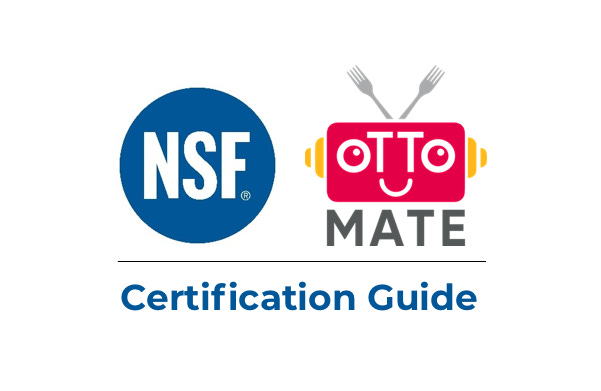The OttOmate Guide to NSF Certification: Working with a Third-Party Agency
How to get help at every phase of the product development process.
It is essential for food operators to prove that they are doing everything possible to keep their employees and customers safe. Consequently, commercial food equipment manufacturers must demonstrate how their equipment will help operators to reach their food safety goals. Third-party agencies such as NSF International serve as a bridge between food operators and manufacturers, providing services such as accredited certification that validate the safety of the equipment.
The use of automation and robotics in food equipment is helping to make the foodservice industry more efficient and safer. Yet, sanitation by design is often overlooked in the development phase, sometimes resulting in costly and lengthy delays for the manufacturer. Entrepreneurs and engineers alike benefit from familiarizing themselves with the regulatory requirements for foodservice equipment to avoid obstacles on the road to production.
In entering the world of food safety, startups are sometimes unfamiliar with hygienic standards, as well as the local codes and government requirements for food equipment. Compliance with regulations and standards certifications should be thought of as a solution to these risks. With new inventions and features introduced nearly every day, it’s critical that innovative equipment is evaluated and tested against existing standards to ensure food safety is properly maintained. Even equipment that is fully automated requires basic principles of hygienic design (such as radius’, cleaning in place, fasters, etc.) and continues to pose important food safety risks that manufacturers should be aware of.
At NSF, we review products at various phases of the development process – including the alpha and beta stages (not just production). By setting checkpoints in the timeline to review food safety, manufacturers can minimize setbacks and accelerate products to market. While the future of foodservice equipment is still being written, we do know that established sanitation and hygienic benchmarks will remain constants.
Consider bringing on a third-party partner, such as NSF, early on to help you evaluate potential risks prior to the introduction of equipment to the market. Attaining product certification from a certification body provides external validation that the product is cleanable, hygienically designed, and safe to use in certified applications. At NSF, we work with entrepreneurs and product innovators to align design features with the requirements of the NSF/ANSI Commercial Food Equipment standards.
Our services include:
Technical education
Standards training
Prototype design validation
Field evaluations
Certification
Validation testing
Thank you for reading our OttOmate Guide to NSF Certification. Our team at NSF is here to help and answer any questions you may have about NSF/ANSI sanitation standards for foodservice equipment, the certification process, or certification requirements. Feel free to reach out to our team of experts by emailing us at foodequipmentinfo@nsf.org. Visit our website to learn more.




